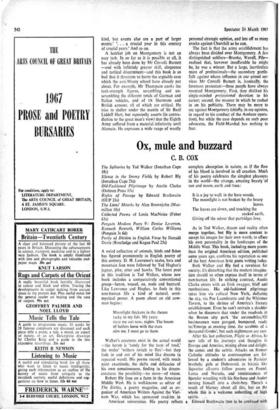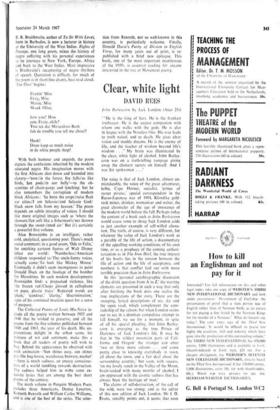Ox, mule and buzzard
C. B. COX
The Solitaries by Ted Walker (Jonathan Cape 18s) Silence in the Snowy Fields by Robert Bly (Jonathan Cape 21s) Old-Fashioned Pilgrimage by Austin Clarke (Dolmen Press 15s) Rights of Passage by Edward Brathwaite (OUP 21s)
The Lions' Mouths by Alan Brownjohn (Mac- millan 18s) Collected Poems of Louis MacNeice (Faber 63s)
Penguin Modern Poets 9: Denise Leverton, Kenneth Rexroth, William Carlos Williams (Penguin 3s 6d) Purity of Diction in English Verse by Donald Davie (Routledge and Kegan Paul 25s)
A weird collection of animals, birds and fishes has figured prominently in English poetry of this century. D. H. Lawrence's snake, bats and mountain lion were followed by Ted Hughes's jaguar, pike, otter and hawks. The latest poet in this tradition is Ted Walker, whose new book includes a comparatively conventional group—heron, weasel, ox, mule and buzzard. Like Lawrence and Hughes, he finds in this non-human life a kind of natural, semi- mystical power. A poem about an old cow- man begins: Moonlight thickens in the rheum tacky in my lids. My years stare me out now, nights. The boom of heifers loose with the stars stirs me. I must go to them.
Walker's creatures exist in the actual world —the heron is 'randy for the taste of toad,' the mules' withers twitch to flies'—but they fade in and out of his mind like dreams (a repeated word). His poems record, with much quiet exactitude, the shifts and delicacies of his own consciousness, finding in his dream- creatures the possibility—no more—of vision.
Robert Bly lives on a farm in the American Middle West. He is well-known as editor of The Sixties, a poetry magazine, and as or- ganiser of American Writers Against the Viet- nam War, which has sponsored read-ins in American universities. His poetry reflects complete absorption in nature, as if the flow of his blood is involved in all creation. Much of his poetry celebrates the simplest pleasures in the world—the strange, amazing beauty of sun and moon, earth and trees: It is a joy to walk in the bare woods.
The moonlight is not broken by the heavy leaves.
The leaves are down, and touching the soaked earth,
Giving off the odour that partridges love.
As in Ted Walker, dream and reality often merge together, but Bly is more content to accept his images for their own worth, to efface his own personality in the landscapes of the Middle West. This book, including more poems than the original American edition, published some years ago, confirms his reputation as one of the best American lyric poets writing today.
Both Walker and Bly feel a revulsion for society; it's disturbing that the modern imagina- tion should so often express itself in terms of non-human life. In striking contrast, Austin Clarke enters with an Irish swagger, bluff and rumbustious. His old-fashioned pilgrimage takes him via cubical New York, dollaring the sky, via Poe Launderette and the Whitthan Tavern, to the shrines of America's literary establishment. Even he can't restrain a shudder when he discovers that under the rosebuds in the Boston city park 'the autornobiles/Of businessmen were garaged, buinpered, ready to/Emerge at evening time, the scrabble of a thousand/Grubs'; but such nightmares are rare.
After his last collection, Flight to Africa, he now tells of his journeys and thoughts in Europe and America, mixing abuse and delight, the comic and the satiric. Attacks on Roman Catholic attitudes to contraception are fol- lowed by a student's adventures in Parisian brothels; girls at Dubrovnik in bikinis like liquorice all-sorts follow poems on Pound, Lorca and Neruda, and reminiscences of Spender wrestling with his fire-hose and Auden turning himself into a choir-boy. There's a touch of blarney about all this, but on the whole this is a welcome . unbottling of high spirits.
a Edward Brathwaite (not to be confused with
E. R. Braithwaite, author of To Sir With Love), born in Barbados, is now a lecturer in history at the University of the West Indies. Rights of Passage, one long poem, mixes the history of negro suffering with his personal experiences as he journeys to New York, Europe, Africa and back to the West Indies. Most impressive is Brathwaite's recapturing of negro rhythms of speech. Quotation is difficult, for much of the poem is in short-line chants, best read aloud. 'The Dust' begins:
Evenin' Miss Evvy, Miss Maisie, Miss Maud. Olive, how you? How you, Eveie, chile? You tek dat Miraculous Bush fuh de trouble you tell me about?
Hush!
Doan keep so much noise in de white people shop!
With both humour and anguish, the poem depicts the confusions inherited by the modern educated negro. His imagination moves with the first Africans shot down and hounded into slavery—'now/in the forest, fire falls/us like birds, hot pods/in our belly'—to the ob- scenities of chain-gangs and lynching; but he also remembers the corruption of modern black Africans: `So burn the crops/raise flash
car cities/I am Selassie/and Selassie God/
black snow falls from my heaven.' The poem depends on subtle interplay of voices. I should like more original images such as 'where the showers/fan soft like a fisherman's/net thrown through the sweet-/ened air.' But it's certainly a powerful first volume.
Alan Brownjohn is an intelligent, rather cold, analytical, questioning poet. There's much social comment; in a good poem, 'Ode to Felix,' the smirking cartoon figures of Walt Disney infest our world : 'Numberless/American children responded to/The uncle-funny voices, actually came/To look like Mickey Mouse.' Eventually it didn't seem incongruous to paint Donald Duck on the fuselage of the bomber for Hiroshima. In such modern developments Brownjohn finds a prepacked violence, like the frozen red/Chops glossed in cellophane on puce, plastic trays.' Repeated words are 'plain,' candour,"clarity,"discrimination,' signs of his continual insatiate quest for a sense of purpose.
The Collected Poems of Louis MacNeice in- clude all the poetry written between 1925 and
1948 that he wished to preserve, and all the poems from the five volumes published between 1949 and 1963, the year of his death. His un- pretentious delight in the urban scene, his mixture of wit and sentiment, make this a book that all readers of poetry will wish to buy. Behind the appearances he observed with such animation—'Sun shines easy, sun shines gay/On bug-house, warehouse, brewery, market' —there is much sadness, an uneasy conscious- ness of a world tumbling towards destruction. The sadness helped him to write some ex- quisite lyrics that are among the best short poems of the century.
The ninth volume in Penguin Modern Poets includes three Americans, Denise Levertov, Kenneth Rexroth and William Carlos Williams, and is one of the best of the series. The selec- tion from Rexroth, not so well-known in this country, is particularly welcome. Finally, Donald Davie's Purity of Diction in English Verse, for many years out of print, is re- published with a brief new epilogue. This book, one of the most important manifestoes of the 1950s, is essential reading for anyone interested in the rise of Movement poetry.



































 Previous page
Previous page